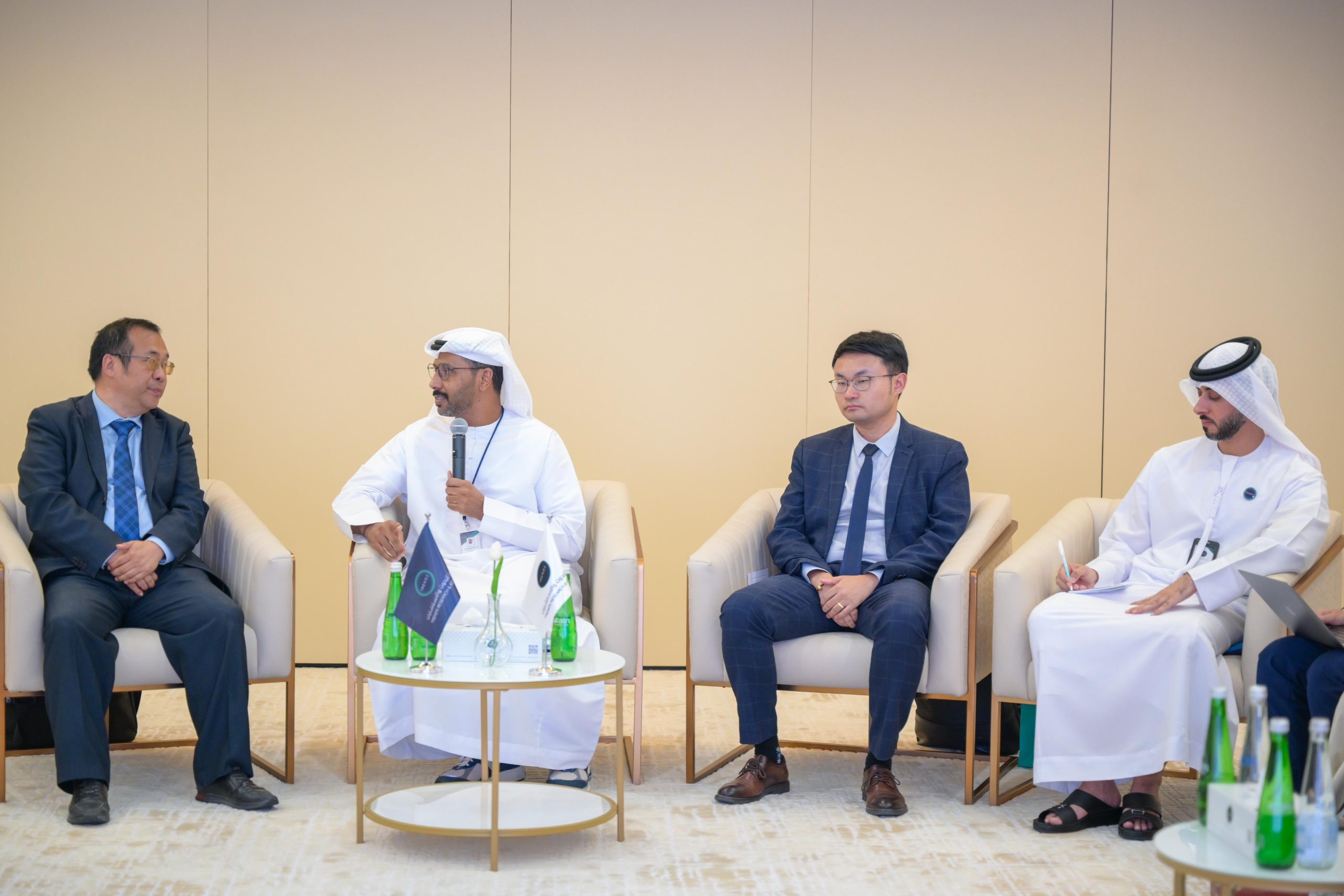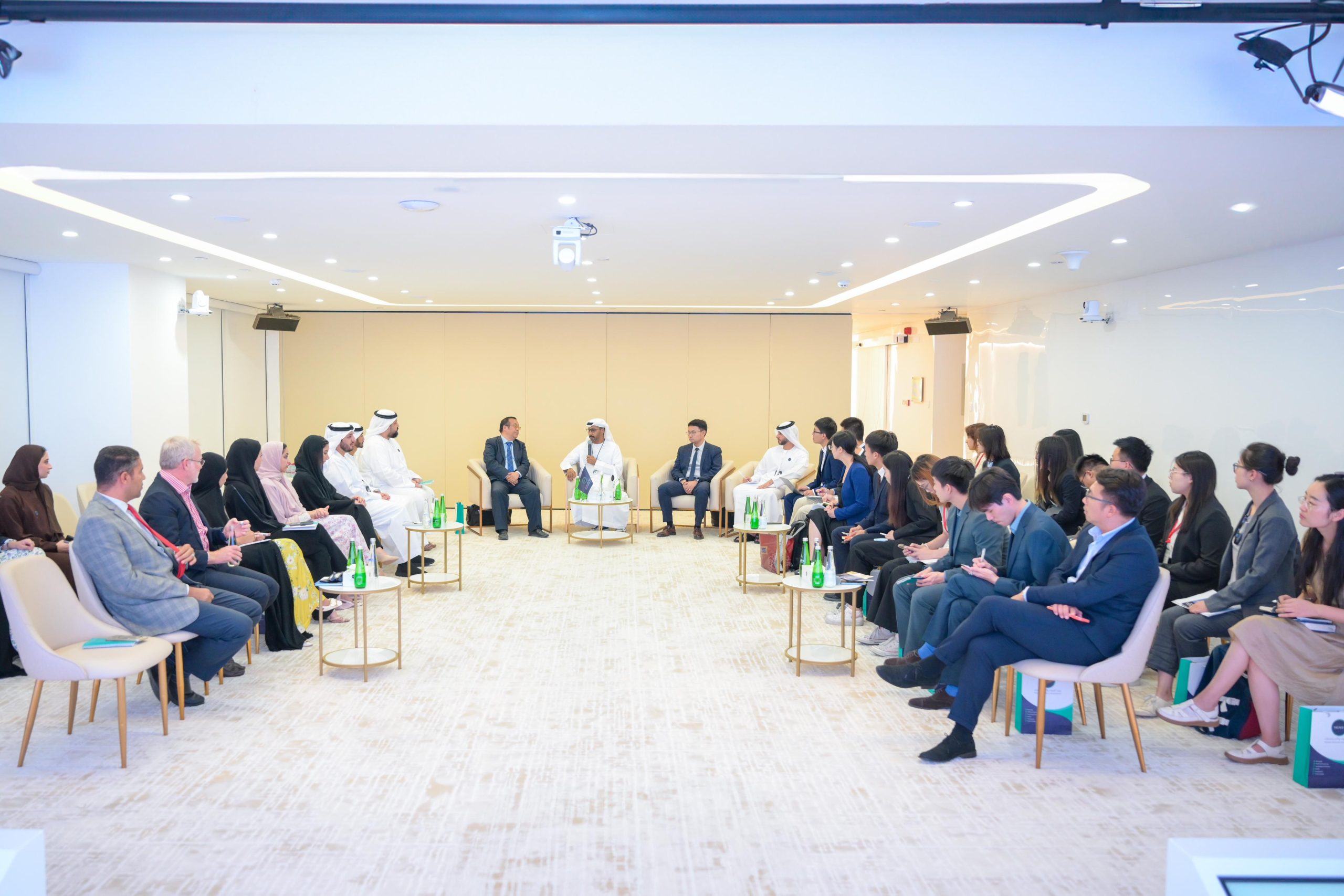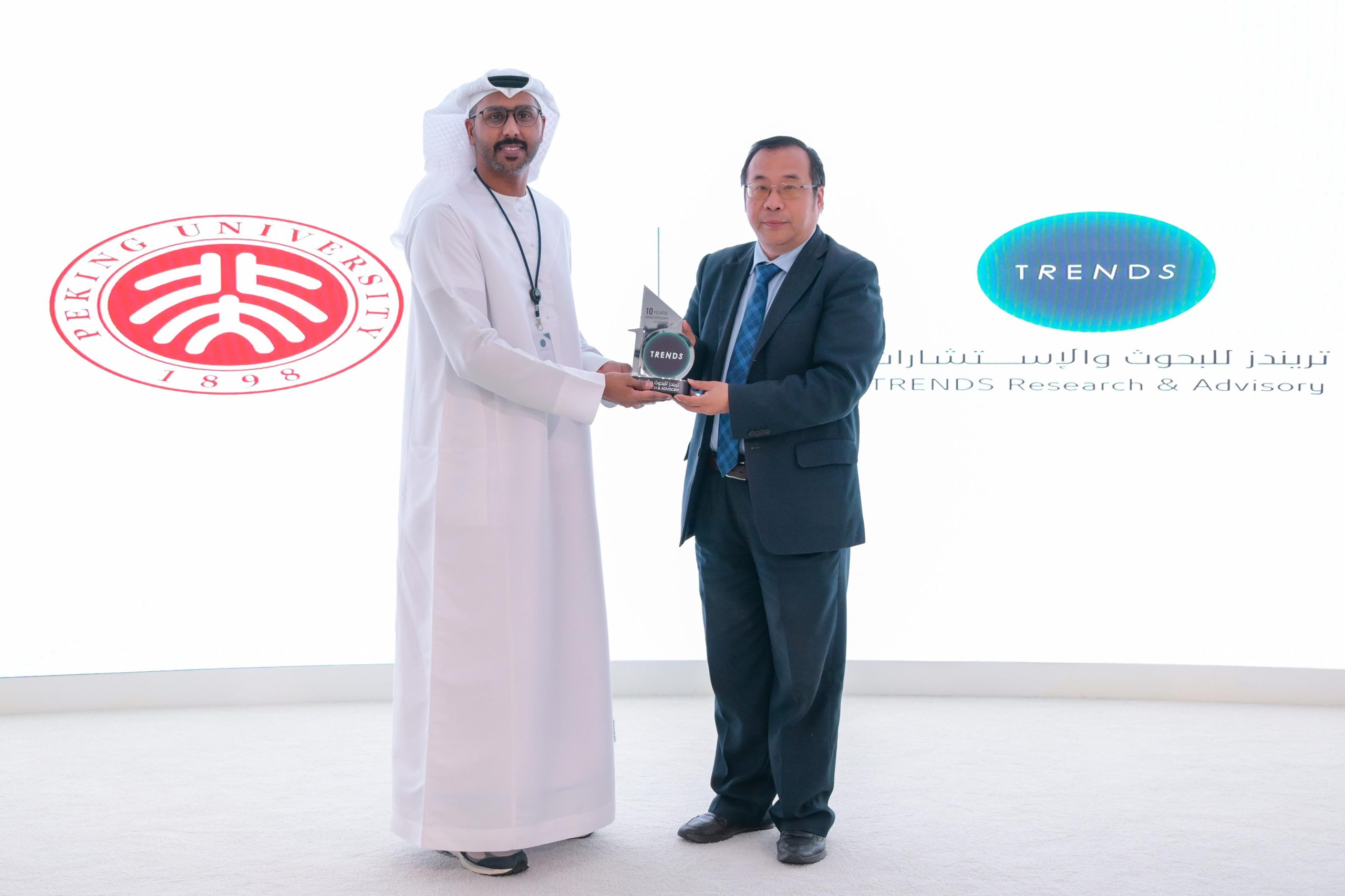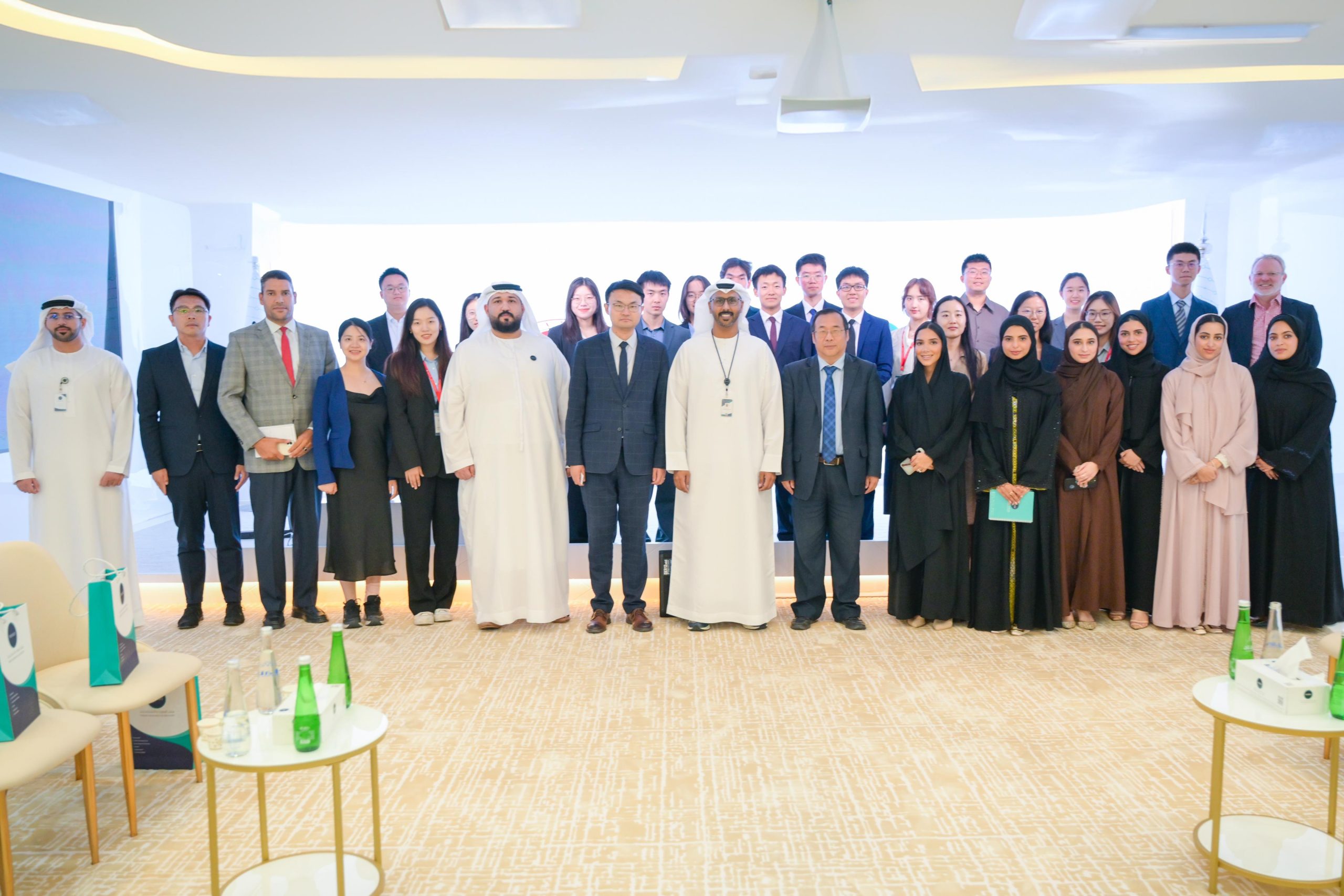TRENDS Research and Advisory held a panel discussion with an academic delegation from Peking University, China, exploring prospects for cooperation and research exchange. Both sides discussed several future research projects, particularly in the field of joint publishing and training, as well as collaboration in organizing conferences, symposia, and regular discussion sessions.
This discussion took place during the delegation’s visit to TRENDS’ headquarters in Abu Dhabi, where both sides also emphasized the importance of enhancing partnership avenues in specialized international studies. They highlighted the need to exchange expertise and experts to support the movement of research and advance the work and outcomes of think tanks and academic and research institutions, thereby strengthening their role in understanding and forecasting events.
The Peking University delegation included Prof. Fu Zhiming, Vice Dean of School of Foreign Languages, Peking University; Prof. Wu Bingbing, Director of Center for Middle Eastern Studies at Peking University; Prof. Li Ruiheng, Assistant Professor, Department of Arabic Language and Culture, School of Foreign Languages, Peking University; Ms. Wang Yinhuan, Ph.D Candidate, Department of West Asian Languages and Cultures, School of Foreign Languages, Peking University; Ms. Liu Chenwei, Ph.D Candidate, Department of Applied Linguistics, School of Foreign Languages, Peking University, and several other graduate and undergraduate students from various schools of Peking University.
 Complementary Roles
Dr. Mohammed Abdullah Al-Ali, CEO of TRENDS Research and Advisory, emphasized the importance of complementary roles between academic and research institutions in disseminating knowledge. He noted TRENDS’ commitment to enhancing cooperation and partnership with academic and research institutions at both regional and international levels.
Al-Ali appreciated the constructive dialogue with the Peking University delegation, stating that TRENDS aspires to and is keen on ongoing coordination with academic institutions, research centers, and think tanks due to their wealth of expertise in research.
Al-Ali pointed out that TRENDS aims to strengthen effective relationships and partnerships with regional and international academic and research institutions, including Peking University, which is China’s foremost national university and one of the oldest higher education institutions. The university is a leader in research and teaching, possessing leading research institutions and groups, making the cooperation between the two sides constructive and supportive of global research.
Complementary Roles
Dr. Mohammed Abdullah Al-Ali, CEO of TRENDS Research and Advisory, emphasized the importance of complementary roles between academic and research institutions in disseminating knowledge. He noted TRENDS’ commitment to enhancing cooperation and partnership with academic and research institutions at both regional and international levels.
Al-Ali appreciated the constructive dialogue with the Peking University delegation, stating that TRENDS aspires to and is keen on ongoing coordination with academic institutions, research centers, and think tanks due to their wealth of expertise in research.
Al-Ali pointed out that TRENDS aims to strengthen effective relationships and partnerships with regional and international academic and research institutions, including Peking University, which is China’s foremost national university and one of the oldest higher education institutions. The university is a leader in research and teaching, possessing leading research institutions and groups, making the cooperation between the two sides constructive and supportive of global research.
 Joint Studies
Members of the Peking University delegation appreciated the global strategy and vision of TRENDS, highlighting the center’s openness to various international academic institutions and think tanks. This openness brings viewpoints and ideas closer regarding the analysis of issues and crises, tackling them through scientific research and joint studies. They affirmed that TRENDS has become a reference point regionally and internationally, with its research outputs keeping pace with global events and developments accurately and objectively.
They explained that Peking University is open to research centers worldwide, believing in the importance of complementary roles and the exchange of views on issues at the forefront of the global scene. They added that research and knowledge sharing between the university and TRENDS would play a constructive and pivotal role in providing objective and accurate insights and analyses and offering useful and effective solutions.
Joint Studies
Members of the Peking University delegation appreciated the global strategy and vision of TRENDS, highlighting the center’s openness to various international academic institutions and think tanks. This openness brings viewpoints and ideas closer regarding the analysis of issues and crises, tackling them through scientific research and joint studies. They affirmed that TRENDS has become a reference point regionally and internationally, with its research outputs keeping pace with global events and developments accurately and objectively.
They explained that Peking University is open to research centers worldwide, believing in the importance of complementary roles and the exchange of views on issues at the forefront of the global scene. They added that research and knowledge sharing between the university and TRENDS would play a constructive and pivotal role in providing objective and accurate insights and analyses and offering useful and effective solutions.
 Supporting Research
Awadh Al-Breiki, Head of TRENDS Global Sector, affirmed that the center is always keen on continuous coordination and cooperation with academic and research institutions and think tanks. This supports all fields of research, contributing to the production of joint research and studies that address contemporary global issues.
Al-Breiki noted that the endeavors of TRENDS and Peking University align in maximizing the benefits of research outputs and covering regional and global events with useful analyses and insights. He added that constant communication between academic entities and active research centers supports the movement of research and creates sustainable strategic partnerships.
Supporting Research
Awadh Al-Breiki, Head of TRENDS Global Sector, affirmed that the center is always keen on continuous coordination and cooperation with academic and research institutions and think tanks. This supports all fields of research, contributing to the production of joint research and studies that address contemporary global issues.
Al-Breiki noted that the endeavors of TRENDS and Peking University align in maximizing the benefits of research outputs and covering regional and global events with useful analyses and insights. He added that constant communication between academic entities and active research centers supports the movement of research and creates sustainable strategic partnerships.

 Complementary Roles
Dr. Mohammed Abdullah Al-Ali, CEO of TRENDS Research and Advisory, emphasized the importance of complementary roles between academic and research institutions in disseminating knowledge. He noted TRENDS’ commitment to enhancing cooperation and partnership with academic and research institutions at both regional and international levels.
Al-Ali appreciated the constructive dialogue with the Peking University delegation, stating that TRENDS aspires to and is keen on ongoing coordination with academic institutions, research centers, and think tanks due to their wealth of expertise in research.
Al-Ali pointed out that TRENDS aims to strengthen effective relationships and partnerships with regional and international academic and research institutions, including Peking University, which is China’s foremost national university and one of the oldest higher education institutions. The university is a leader in research and teaching, possessing leading research institutions and groups, making the cooperation between the two sides constructive and supportive of global research.
Complementary Roles
Dr. Mohammed Abdullah Al-Ali, CEO of TRENDS Research and Advisory, emphasized the importance of complementary roles between academic and research institutions in disseminating knowledge. He noted TRENDS’ commitment to enhancing cooperation and partnership with academic and research institutions at both regional and international levels.
Al-Ali appreciated the constructive dialogue with the Peking University delegation, stating that TRENDS aspires to and is keen on ongoing coordination with academic institutions, research centers, and think tanks due to their wealth of expertise in research.
Al-Ali pointed out that TRENDS aims to strengthen effective relationships and partnerships with regional and international academic and research institutions, including Peking University, which is China’s foremost national university and one of the oldest higher education institutions. The university is a leader in research and teaching, possessing leading research institutions and groups, making the cooperation between the two sides constructive and supportive of global research.
 Joint Studies
Members of the Peking University delegation appreciated the global strategy and vision of TRENDS, highlighting the center’s openness to various international academic institutions and think tanks. This openness brings viewpoints and ideas closer regarding the analysis of issues and crises, tackling them through scientific research and joint studies. They affirmed that TRENDS has become a reference point regionally and internationally, with its research outputs keeping pace with global events and developments accurately and objectively.
They explained that Peking University is open to research centers worldwide, believing in the importance of complementary roles and the exchange of views on issues at the forefront of the global scene. They added that research and knowledge sharing between the university and TRENDS would play a constructive and pivotal role in providing objective and accurate insights and analyses and offering useful and effective solutions.
Joint Studies
Members of the Peking University delegation appreciated the global strategy and vision of TRENDS, highlighting the center’s openness to various international academic institutions and think tanks. This openness brings viewpoints and ideas closer regarding the analysis of issues and crises, tackling them through scientific research and joint studies. They affirmed that TRENDS has become a reference point regionally and internationally, with its research outputs keeping pace with global events and developments accurately and objectively.
They explained that Peking University is open to research centers worldwide, believing in the importance of complementary roles and the exchange of views on issues at the forefront of the global scene. They added that research and knowledge sharing between the university and TRENDS would play a constructive and pivotal role in providing objective and accurate insights and analyses and offering useful and effective solutions.
 Supporting Research
Awadh Al-Breiki, Head of TRENDS Global Sector, affirmed that the center is always keen on continuous coordination and cooperation with academic and research institutions and think tanks. This supports all fields of research, contributing to the production of joint research and studies that address contemporary global issues.
Al-Breiki noted that the endeavors of TRENDS and Peking University align in maximizing the benefits of research outputs and covering regional and global events with useful analyses and insights. He added that constant communication between academic entities and active research centers supports the movement of research and creates sustainable strategic partnerships.
Supporting Research
Awadh Al-Breiki, Head of TRENDS Global Sector, affirmed that the center is always keen on continuous coordination and cooperation with academic and research institutions and think tanks. This supports all fields of research, contributing to the production of joint research and studies that address contemporary global issues.
Al-Breiki noted that the endeavors of TRENDS and Peking University align in maximizing the benefits of research outputs and covering regional and global events with useful analyses and insights. He added that constant communication between academic entities and active research centers supports the movement of research and creates sustainable strategic partnerships.




